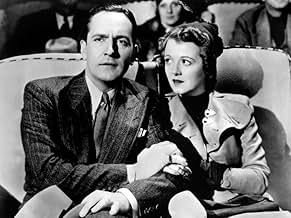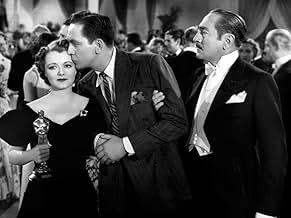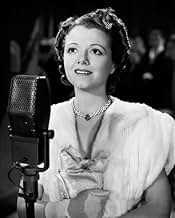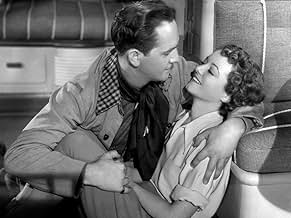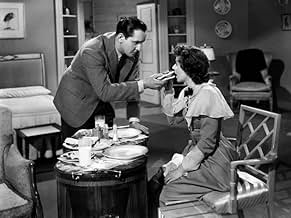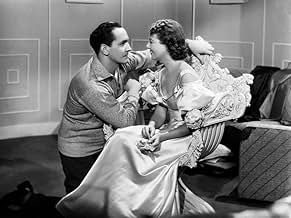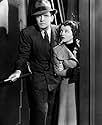Young Esther Victoria Blodgett comes to Hollywood with dreams of stardom and achieves them only with the help of alcoholic leading man Norman Maine, whose best days are behind him.Young Esther Victoria Blodgett comes to Hollywood with dreams of stardom and achieves them only with the help of alcoholic leading man Norman Maine, whose best days are behind him.Young Esther Victoria Blodgett comes to Hollywood with dreams of stardom and achieves them only with the help of alcoholic leading man Norman Maine, whose best days are behind him.
- Won 1 Oscar
- 4 wins & 7 nominations total
Guinn 'Big Boy' Williams
- Posture Coach
- (as Guinn Williams)
Jean Acker
- Woman at Preview
- (uncredited)
Eric Alden
- Niles' Assistant
- (uncredited)
Irving Bacon
- Station Agent
- (uncredited)
Jane Barnes
- Waitress #1
- (uncredited)
Vince Barnett
- Otto
- (uncredited)
Clara Blandick
- Aunt Mattie
- (uncredited)
Storyline
Did you know
- TriviaWhen the drunken Norman Maine character raucously interrupts the Oscar presentation, it was déja vu for Janet Gaynor. She had brought her sister to the Academy Awards ceremony in 1929, when she won the first Best Actress Oscar ever awarded, for 7th Heaven (1927). Her sister became very drunk and completely out of control, thoroughly embarrassing Gaynor.
- GoofsThe Night Court Judge refers to the "commonwealth" of California, but California isn't one of the states with commonwealth status. The judge should have referred to the "state" instead.
- Quotes
Grandmother Lettie: If you've got one drop of my blood in your veins, you won't let Mattie or any of her kind break your heart, you'll go right out there and break it yourself.
- Alternate versionsAlso available in black and white
- ConnectionsEdited into What's Cookin' Doc? (1944)
- SoundtracksCalifornia, Here I Come
(1924) (uncredited)
Music by Joseph Meyer
(variations in the score as Esther arrives in Hollywood)
Featured review
This movie has been done three times: this one in 1937, then in 1954 and finally 1976. I've now seen only this original, and only because I wanted to see a young Janet Gaynor for the first time. Beware, however: a 2012 version is now in pre-production; although, as we all know, it may never be completed – Hollywood being what it is.
Of course, this story – rags to riches in the acting business - was done first by others – principally Katherine Hepburn in Morning Glory (1933) and, oddly enough, again in Stage Door (1937), and again with Katherine Hepburn ably assisted by a host of well-known Hollywood actors, including the tireless Adolphe Menjou who never seemed to mind playing a Hollywood boss, in this and many other similar movies. The difference with Star, of course, is it's maybe the first movie to dig into Hollywood screen acting and make an attempt to lay it bare.
So the story is banal, as most rags to riches fantasies are. Equally, however, it's an exceptionally well-done narrative that strips the gloss off Hollywood – in a genteelly, low-key manner – to show 1937 viewers just what it took to claw your way to the top. And, let's face it: being released in the dog days of the Great Depression and as America geared up for war, audiences of the day lapped it up. Hard times and war drums were on the way again: the people needed to see rags to riches in action, needed to know that hardship and sacrifice were just around the corner. And, failure was not an option.
Today's mainstream audience, on the other hand, would probably laugh at the perceived and implied naivety of the 1930s crowd.
The acting – from Frederic March as Norman Maine (the main actor in the story – such an appropriate name!) who is already on the slippery slopes to alcoholic and acting oblivion just as he meets and falls in love with Janet Gaynor as Esther Blodgett as the aspiring Hollywood wannabee; and both ably assisted by Adolphe Menjou as Hollywood producer, Oliver Niles – raises it to the level of simplistic melodrama and without descending into bathos, fortunately. And that's largely due to March, who is outstanding – literally and figuratively – as the actor with everything to lose. Menjou does his usual, highly professional turn – and never misses a turn or beat. And Gaynor? Well, I'd say she was perfectly cast as the newcomer who makes good, to a point: her down-to-earth, home-spun, wide-eyed trusting nature is personified with her looks, tone and carriage – almost to the point of outdoing Shirley Temple.
Oddly enough, though, Gaynor made her last movie in 1938 and did not reappear until 1957, with a guest appearance in Bernadine with Pat Boone, whom some would remember.
This production of Star, in color, certainly appeals to the visual senses, displaying the lavishness that beckoned neophytes and to which stars become accustomed, all too easily. In contrast, it also shows – with comedy or gentle satire – the daily grind of making movies and is, perhaps, the genesis of the much over-use of out-takes, bloopers and so on in some of today's productions. Photography, editing and script – particularly the last – are all up to scratch, as you would expect from a Selznick/Wellman venture. Dorothy Parker – who wrote the screenplay and who was one of literature's bete noire of the 1930s set – constructed some of the most memorable lines in Hollywood history, especially those from Menjou. Worth seeing just for that alone, in my opinion.
Interestingly and coincidentally, Nathanael West – one-time Hollywood screen writer – published The Day of The Locust in 1939, a novel that takes the Star story and twists it into a horrific nightmare. Not until 1973, however, did John Schlesinger direct a screen version of the same name that has not been repeated; see that one and find out why. Not to be outdone, David Lynch, film noire auteur extraordinaire, has gone one further with Muholland Drive (2001), arguably the ultimate screen statement to date about the prostitution of screen art in the pursuit of fame and fortune, and one of the grittiest horror stories ever put to film. Considering some of the scenes of both, I wouldn't at all be surprised if Lynch has seen this version of Star.
As a significant piece of Hollywood history, this 1937 version should be seen by all film lovers and the starry-eyed. Highly recommended.
Then, come down to earth with The Day of The Locust and deliver a coup de grace with Mulholland Drive, both of which I've reviewed for this site. Enjoy.
Of course, this story – rags to riches in the acting business - was done first by others – principally Katherine Hepburn in Morning Glory (1933) and, oddly enough, again in Stage Door (1937), and again with Katherine Hepburn ably assisted by a host of well-known Hollywood actors, including the tireless Adolphe Menjou who never seemed to mind playing a Hollywood boss, in this and many other similar movies. The difference with Star, of course, is it's maybe the first movie to dig into Hollywood screen acting and make an attempt to lay it bare.
So the story is banal, as most rags to riches fantasies are. Equally, however, it's an exceptionally well-done narrative that strips the gloss off Hollywood – in a genteelly, low-key manner – to show 1937 viewers just what it took to claw your way to the top. And, let's face it: being released in the dog days of the Great Depression and as America geared up for war, audiences of the day lapped it up. Hard times and war drums were on the way again: the people needed to see rags to riches in action, needed to know that hardship and sacrifice were just around the corner. And, failure was not an option.
Today's mainstream audience, on the other hand, would probably laugh at the perceived and implied naivety of the 1930s crowd.
The acting – from Frederic March as Norman Maine (the main actor in the story – such an appropriate name!) who is already on the slippery slopes to alcoholic and acting oblivion just as he meets and falls in love with Janet Gaynor as Esther Blodgett as the aspiring Hollywood wannabee; and both ably assisted by Adolphe Menjou as Hollywood producer, Oliver Niles – raises it to the level of simplistic melodrama and without descending into bathos, fortunately. And that's largely due to March, who is outstanding – literally and figuratively – as the actor with everything to lose. Menjou does his usual, highly professional turn – and never misses a turn or beat. And Gaynor? Well, I'd say she was perfectly cast as the newcomer who makes good, to a point: her down-to-earth, home-spun, wide-eyed trusting nature is personified with her looks, tone and carriage – almost to the point of outdoing Shirley Temple.
Oddly enough, though, Gaynor made her last movie in 1938 and did not reappear until 1957, with a guest appearance in Bernadine with Pat Boone, whom some would remember.
This production of Star, in color, certainly appeals to the visual senses, displaying the lavishness that beckoned neophytes and to which stars become accustomed, all too easily. In contrast, it also shows – with comedy or gentle satire – the daily grind of making movies and is, perhaps, the genesis of the much over-use of out-takes, bloopers and so on in some of today's productions. Photography, editing and script – particularly the last – are all up to scratch, as you would expect from a Selznick/Wellman venture. Dorothy Parker – who wrote the screenplay and who was one of literature's bete noire of the 1930s set – constructed some of the most memorable lines in Hollywood history, especially those from Menjou. Worth seeing just for that alone, in my opinion.
Interestingly and coincidentally, Nathanael West – one-time Hollywood screen writer – published The Day of The Locust in 1939, a novel that takes the Star story and twists it into a horrific nightmare. Not until 1973, however, did John Schlesinger direct a screen version of the same name that has not been repeated; see that one and find out why. Not to be outdone, David Lynch, film noire auteur extraordinaire, has gone one further with Muholland Drive (2001), arguably the ultimate screen statement to date about the prostitution of screen art in the pursuit of fame and fortune, and one of the grittiest horror stories ever put to film. Considering some of the scenes of both, I wouldn't at all be surprised if Lynch has seen this version of Star.
As a significant piece of Hollywood history, this 1937 version should be seen by all film lovers and the starry-eyed. Highly recommended.
Then, come down to earth with The Day of The Locust and deliver a coup de grace with Mulholland Drive, both of which I've reviewed for this site. Enjoy.
- RJBurke1942
- Aug 27, 2010
- Permalink
Details
- Release date
- Country of origin
- Language
- Also known as
- Kariera
- Filming locations
- Production companies
- See more company credits at IMDbPro
Box office
- Budget
- $1,173,639 (estimated)
Contribute to this page
Suggest an edit or add missing content



